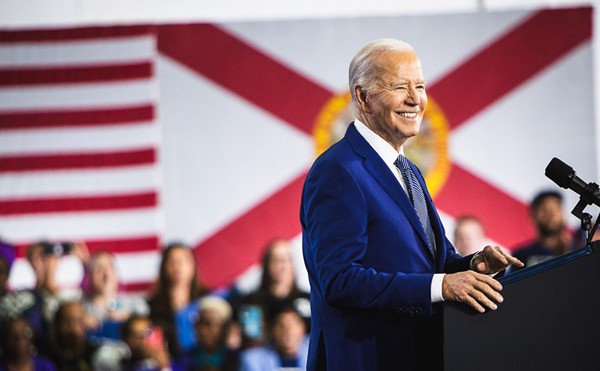
Just minutes after finishing an intense debate with Senate rivals Marco Rubio and Charlie Crist in the studio of WTVT-Fox 13 in Tampa on October 15, Kendrick Meek met the press for a debriefing.
Immediately a reporter repeated the question that moderator John Wilson had just asked him: Would he consider withdrawing from the three-way contest to give Crist a better chance of knocking off the front-runner Rubio?
"I will not drop out of this race for any reason," he said, his voice rising. "I'm nominated by the Democrats of the state of Florida. I mean, I am in this race to run to be the next United States senator."
Yet the question was inevitable.
For Kendrick Meek, it had been a rough week, and frankly, a rough campaign. His candidacy was overshadowed initially by the epic Crist-Rubio Republican primary, but the Miami Congressman reached a high-water mark of sorts on August 24 when he beat expectations and thrashed billionaire Jeff Greene in the Democratic primary.
Michelle B. Patty, an activist and entrepreneur active in the black community in Tampa, says she's appalled at Democrats calling for Meek to step down, calling it "racism at its ugliest."
"That you would take the person who is the Democratic choice, who won the election, and now you're telling him to get out for someone who has no party affiliation? It could end up creating a backlash for future candidates, because in the African-American community we are highly upset about that."
Patty's anger is exactly why Meek was never going to get out of the race, according to University of Florida political scientist Dan Smith.
"Democrats need Kendrick Meek on the ballot to generate enthusiasm for Alex Sink," he says of the party's gubernatorial candidate. "He is there not necessarily as a sacrificial lamb, but as a very important cog in the get-out-the-vote effort for the Democrats and OFA [Organizing For America, the organizing arm for Barack Obama prominently involved in this year's midterms]."

Meek's strategy in recent debates has clearly been to capture those Democrats who have already strayed to Crist or remain undecided, hammering him for wavering on offshore drilling, gay adoption and a woman's right to choose.
But he just hasn't received the respect he believes he's owed, and at times hasn't been able to restrain his frustration about it, such as when the Sierra Club endorsed both him and the governor in early October. Moments after a CL tweet informed the Meek camp about that, a press release was issued announcing the Miami Congressman had rejected the endorsement, calling it "an insult to Florida's environmental community." With his 100 percent record from the League of Conservation Voters, compared to Crist's flip-flopping on offshore drilling and his lack of commitment to climate change, Meek surely had a legitimate gripe. But the slight also reflected the reluctance of some Democratic-aligned groups — and Democrats — to fully embrace his candidacy.
Whether Meek could have beaten a Republican in this year of the Tea Party is dubious, but his chances ended on April 29. That's when Crist, aware that his dream of becoming Florida's next U.S. Senator was doomed due to his fading popularity within the Republican Party of Florida, announced in St Petersburg's Straub Park that he was leaving the GOP and would run as an independent, the only viable option left to him.
In the weeks leading up to his announcement, Crist vetoed SB 6, the controversial education bill that included merit pay for teachers. As a result he earned a co-endorsement from the Florida Education Association, usually a Democratic party ally (they did also co-endorse Meek), as well as the thank-you's of many teachers, who became instant converts to his emerging new political persona.
Thus began the Charlie Crist Independent Tour, billed as the antidote to partisan gridlock but really an effort to cultivate liberal groups, some of whom didn't need much wooing to back him over Meek.
Such was the case with the Teamsters Union. On Labor Day in the Hillsborough County town of Dover, the Florida Pipe Trade's annual picnic this year featured Democratic candidates like Linda Saul-Sena, Bill Heller and Stacy Frank, but the main attraction was Crist, with the charismatic governor treating it just like a campaign event (nearly every one of the 100 people in attendance wore Crist stickers). When the lifelong (until recently) Republican was asked if he'd attended any previous labor events, Crist said he had, but failed to mention when or where.
In some ways, Crist represents the very best and worst of what people desire in their politicians. Unlike most lawmakers, he truly doesn't seem to be filled with ideology, instead preferring always to be of service to "the people." That populism was a key reason why his poll numbers were extraordinarily high in his first couple of years in office — higher than those of his predecessor, Jeb Bush. He was a Republican in a center-right state, and Democrats and independents, turned off by Bush's strong conservative brand, warmed to him instantly when he showed he was more moderate on issues like the environment and education. His legendary people skills also boosted his popularity numbers, though Republican legislators were never as impressed.
But while acceptable to the GOP establishment, his overtures to Democrats (such as restoring felon rights more quickly, expanding early voting sites before the 2008 election, and naming liberal Justice James Perry to the Supreme Court) enraged the conservative base, which is why Crist was always vulnerable to a right wing challenge.
But it's been rough to be a man without a party. Some Democratic voters have naturally taken to supporting him, but others aren't nearly ready to support the Republican, or trust him, for that matter.
Linda Shetter is one Barack Obama supporter who will vote for Crist. While waiting in line to see Meek appear with Bill Clinton in St. Petersburg last week, she told CL, "Now that he's an independent, I think he's making good decisions, so I like him. I always liked him, now I like him more." When asked why she couldn't support her party's chosen candidate, she mentioned the situation with a now indicted developer, Dennis Stackhouse, whom Meek had helped get federal funding for a project in a poor part of his congressional district, and who employed his mother, former Congresswoman Carrie Meek, and leased her a Cadillac Escalade, developments that Meek has said he had no clue about. "So I'm just not sure about him," she says, remaining silent when Crist's alliance with former party chair Jim Greer is mentioned. Greer, Crist's handpicked choice to lead the state party, was arrested this summer on fraud charges.
Although Crist's political future looks clouded (there has been some speculation that he might run for Bill Young's Pinellas County Congressional seat in 2012, if Young finally retires), some suggest he may do a Jeb Bush and go into the private sector to finally make big money that ex-governors can.
Of course, his political future might not be in doubt if he had run for re-election for governor this year, but Crist's ambitions never included a second term in Tallahassee, but instead an upgrade to Washington. He's been bumped from that flight.
Enter Marco Rubio, who had the conservative base at "hello."
In mid-October, Marco Rubio stood side by side with Bobby Jindal, the governor of Louisiana, in a stultifyingly hot warehouse in West Tampa. Jindal, an aspiring GOP player on the national scene, was making one of many appearances on behalf of Republican candidates across the country.
But on this Wednesday afternoon, just three weeks before the election, it appeared that Rubio had already eclipsed Jindal as a rock star on the American political radar. Days later Rubio would be listed as the first person in Time Magazine's list of the 40 biggest political players in the U.S. under 40 years of age. Shortly after that, GQ placed him third on their DC power list (behind Haley Barbour and Chuck Schumer).
Sure, he hasn't been elected yet, but why wait? Some wags have even thrown the former Florida Speaker of the House into the potential mix of potential GOP 2012 presidential candidates.
He's come a long way from polling some 30 points below Crist in one of the first surveys in the GOP Senate race.
Rubio's rise is a testament to the power of the Tea Party movement. Infinitely smarter than most of the other Senate candidates across the country who are proudly campaigning under that movement, he has eschewed their rough rhetoric, but not their overall theme — that federal spending is out of control under Barack Obama, and the American way of life is under threat.
Rubio's stump speech has changed little since he initially spoke with CL in the spring of 2009. The theme then and now is American Exceptionalism: a rallying cry for conservatives who fear the very American dream is at stake.
Although his campaign shtick is standard 2010 Republican — the stimulus was a bust, the health care bill was outrageous — Rubio has shown some courage simply by saying that he wants to look at ways to reform Social Security to keep it solvent in the coming decades, but only for those who are under 55 years old.
For that bit of originality, Crist has accused him of dangerously endangering the entitlement program. Though such criticisms smack of fear-mongering, Rubio has spoken in favor of at least partially privatizing Social Security. The Miami Herald reported that back in January while in Tallahassee, Rubio said he supported "giving people the option of taking some of their Social Security money, at least a portion thereof, and investing it in an alternative to the Social Security system itself."
Another charge is that Rubio has been disingenuous about his use of a Republican Party of Florida credit card. In February, the Herald reported that records showed Rubio sent payments to American Express totaling $16,000 for his personal expenses during his tenure as House speaker.
Yet remarkably, Rubio denies that the party has ever paid for personal expenses. And that $16,000 in charges does not include use of an RPOF Amex card before November of 2006 (he had use of a card in 2004 and 2005).
Chris Ingram, a GOP political consultant and author of the column "Irreverent View" (which CL runs on The Daily Loaf blog), claimed in September that Rubio had told him privately that he had spent between $4,000 to $5,000 on his kitchen floor, a charge Rubio later denied.
In an interview, Ingram goes further, discussing Rubio's use of the card for a family reunion in Georgia that came to thousands of dollars.
"It's a pattern of an entitlement attitude," Ingram says. "Among those who are fiscally conservative-leaning Republicans, it's hypocritical for us to say we want a fiscally responsible U.S. Senator to control the deficit and debt and spending, and then turn the other cheek to the indiscretions of Marco Rubio and expect him to go to Washington and do the right thing."
But then that would interrupt the narrative of the "first Tea Party candidate" to go to the Senate, wouldn't it? With early voting results showing far more registered Republicans than registered Democrats flocking to the polls, don't expect many other rank and file "R's" to follow Ingram's lead.
















